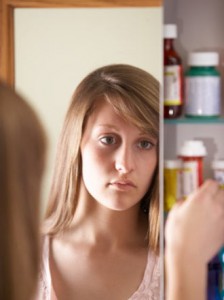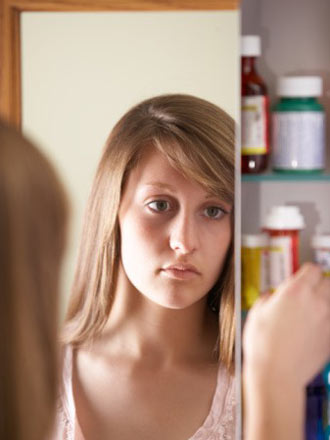How to spot prescription drug use and what parents can do to prevent it.
Wayne Frith finds the ever-increasing number of teens abusing prescription and over-the-counter medications alarming.
“[It] has grown exponentially over the last three to five years,” says Frith, father of two and executive director of Substance Abuse Free Environment Inc. (SAFE) in Chesterfield County. “It’s by far the fastest growing group of substances being abused across the United States.”
 Between 1998 and 2008, the number of substance abuse admissions of those age 12 and above involving abuse of prescription pain relievers rose by more than 400 percent, from 2.2 percent to 9. 8 percent, according to the Substance Abuse and Mental Health Services Administration. Approximately one-third of new abusers of prescription drugs are between 12 and 17 years old.
Between 1998 and 2008, the number of substance abuse admissions of those age 12 and above involving abuse of prescription pain relievers rose by more than 400 percent, from 2.2 percent to 9. 8 percent, according to the Substance Abuse and Mental Health Services Administration. Approximately one-third of new abusers of prescription drugs are between 12 and 17 years old.
The Rise of Pill Use Among Teens
“The non-medical use of prescription pain-relievers is now the second [marijuana is the first] most prevalent form of illicit drug use in the nation,” says Pamela S. Hyde, administrator of the SAMHSA. “Its tragic consequences are seen in substances abuse treatment centers and hospital emergency departments throughout our nation.”
There are four types of prescription medications that are commonly abused, according to the National Survey on Drug Use and Health – pain relievers such as OxyContin and Vicodin, stimulants such as Ritalin for ADHD, and sedatives and tranquilizers such as Valium and Xanax.
Society may be to blame for an emphasis on pill popping.
“If a child has a headache or stomachache or bad day, the answer is to take a pill instead of changing the child’s diet [for example] or getting more sleep or doing something fun,” says Denise Miller, president of the Regional Drug Free Alliance and chair of the Parents Council of Commonwealth Parenting.
Adolescents and teens often mimic the actions of adults. So when they see their parents taking prescription and over-the-counter medications, they assume those types of medicines are safe to ingest. But taken inappropriately or in large quantities, those seemingly safe medications can be fatal.
One trend that alarms Frith is the growing number of “Pharm” parties where teens raid their parents’ and grandparents’ medicine cabinets to get prescription drugs. Once they obtain the drugs, they throw a party and dump large quantities of various drugs into a bowl and stir them up.
“They will take a handful of the drugs to see what happens,” Frith says. “It’s really scary. Different chemicals mixed together can be lethal.”
Treating a drug overdose from this type of party can be difficult. “The doctors don’t know what [teens] have taken,” Miller says.
Where Teens are Getting the Pills
Teens get prescription drugs from various sources, often from friends or relatives. Some teens steal drugs from the medicine cabinets of older adults because They tend to accumulate a variety of medications. Others are more inventive in their approach.
“One of the strategies that kids use is they will go with an adult friend to look at an open house and then slip into the bathroom and clean out the medicine cabinet,” Frith says. “They may also go doctor shopping. That’s where they go from doctor to doctor with some malady such as back pain. They get a prescription and then go to another doctor [for the same prescription].”
Teens will either use the drugs themselves or sell them to other teens. “The market for these drugs is huge,” Frith says. “I have heard of OxyContin selling for as much as $15 a tablet.”
Prescription drugs are just part of the problem. Teens are also abusing over-the-counter drugs. The main culprit is dextromethorphan (DXM), a cough suppressant in cough and cold medicines. Taken in large doses, DXM can cause hallucinations.
“Many stores are putting it behind the counter,” Frith says, noting that it can be ordered online in pure powder form. “It can be sold as a street drug. It’s very dangerous. There was a case where a teen took four capsules of powder DXM and died.”
According to Miller, who is the mother of two young adults, 19 and 21, the reason for this type of drug abuse varies from teen to teen. “Our culture is very stressful,” observes Miller. “There is pressure to achieve and excel.”
Some teens may be looking for drugs that will help them with performance enhancement. “They live in a very competitive world and feel the need to make themselves smarter, faster, stronger, thinner and more popular,” Miller says, adding that teens also become bored very easily and “seek a ‘quick fix’ to help them escape their personal, family, or school-related stress.”
Parents may find it difficult to tell if their teens are misusing drugs. Some of the signs of prescription drug abuse include:
- The disappearance of medicines from the medicine cabinet
- Empty cough syrup bottles in the trash
- Prescription bottles with the name scratched off
- Unusual pills lying around
- Prescription bottles from multiple doctors
- Money missing from the home
- Negative changes in schoolwork and/or extracurricular activities
- A difference in how the teen acts – he or she may be more listless or irritable. Other physical symptoms include slurred speech, staggering walk, unusual sweating, vomiting, dilated pupils, dizziness and numbness of extremities.
Parents need to take action if they suspect prescription and/or over-the-counter drug abuse. You should first have an honest talk with your teen about drug abuse. As a cautionary measure, you should dispose of all old medications around the home.
“Parents should also encourage relatives to clean out their medicine cabinets,” Frith says, noting that drugs should never be flushed down the toilet because it may taint the water supply.
It’s crucial that parents educate themselves about prescription and over-the-counter drug abuse. “You want to read articles about the problem and talk to other parents,” Frith says. “It can be very effective if parents network together.”
It’s extremely important that parents be mindful of the dangers of this type of drug abuse.
“They have to know the truth and the seriousness of the situation,” Miller says. “They need to be aware of the dangers and not become enablers.”




